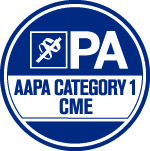- Ashley Bartlett
Series Overview
This didactic activity covers an extensive range of topic areas within the practice of clinical cardiac electrophysiology. The evolving curriculum is designed with input from learners, particularly CCEP fellows. Recurrent topics include but are not limited to pacing, antiarrhythmic drugs, entrainment, SVT, pacemaker and ICD troubleshooting, localization of VT, inherited arrhythmias, device extractions, basic arrhythmia mechanisms, accessory pathway ablation, arrhythmias in special populations, CRT troubleshooting, sudden cardiac death in athletes, electroanatomic mapping systems, syncope, wide complex tachycardia, WPW management, atrial fibrillation ablation, intracardiac echocardiography, anticoagulation therapy, atrial tachyarrhythmias, PVC/VT, ICDs, pacemakers and end-of-life care.
Global Objectives
As a result of participation in this educational series, members of the healthcare team will be able to:
- Provide state-of-the-art, interprofessional, patient-centered CCEP care to patients in the clinic, on the inpatient services and in the procedural laboratory.
- Apply knowledge to clinical practice in the areas of diagnostic testing for clinical EP, use of newly released medications, and implementation of guideline recommended treatment for cardiovascular disease.
- Effectively communicate with the members of interprofessional, multidisciplinary healthcare team to optimize management of the multitude of diseases involving clinical cardiac EP.
- Thoughtfully assess strategies to improve diversity, equity, and inclusion (DEI) efforts to better serve patients and address health disparities.
Intended Audience
MD/DO, RN, APRN, Physician Assistants, Fellows, and Clinical Exercise Physiologists
Planning Committee
| Zachary D. Goldberger, MD, MS, Chair | Peter Rahko, MD, Chair | Ashley Bartlett, Coordinator |
| Amanda Breuer, PA-C | Kjersten Busse, NP | Andrew Pap, MD |
Accreditation Statement
 | In support of improving patient care, the University of Wisconsin–Madison ICEP is jointly accredited by the Accreditation Council for Continuing Medical Education (ACCME), the Accreditation Council for Pharmacy Education (ACPE), and the American Nurses Credentialing Center (ANCC) to provide continuing education for the healthcare team. |
Credit Designation Statements
American Medical Association (AMA) The University of Wisconsin–Madison ICEP designates this live activity for a maximum of 1 AA PRA Category 1 Credit(s)™. Physicians should claim only the credit commensurate with the extent of their participation in the activity. | |
American Nurses Credentialing Center (ANCC)
The University of Wisconsin–Madison ICEP designates this live activity for a maximum of 1 ANCC contact hour. | |
 | American Academy of Physician Assistants (AAPA) The University of Wisconsin–Madison ICEP has been authorized by the American Academy of PAs (AAPA) to award AAPA Category 1 CME credit for activities planned in accordance with AAPA CME Criteria. This activity is designated for 1 AAPA Category 1 CME credits. PAs should only claim credit commensurate with the extent of their participation. |
Continuing Education Units (CEUs) The University of Wisconsin–Madison ICEP, as a member of the University Professional & Continuing Education Association (UPCEA), authorizes this program for 0.1 continuing education units (CEUs) or 1 hour. |
Policy on Faculty and Sponsor Disclosure
It is the policy of the University of Wisconsin–Madison Interprofessional Continuing Education Partnership (ICEP) to identify, mitigate and disclose all relevant financial relationships with ineligible companies* held by the speakers/presenters, authors, planners, and other persons who may influence content of this accredited continuing education (CE). In addition, speakers, presenters and authors must disclose any planned discussion of unlabeled/unapproved uses of drugs or devices during their presentation. For this accredited continuing education activity, all relevant financial relationships have been mitigated and detailed disclosures are listed below.
* Ineligible companies are those whose primary business is producing, marketing, selling, re-selling, or distributing healthcare products used by or on patients. The ACCME does not consider providers of clinical service directly to patients to be ineligible companies.
Detailed disclosures will be available prior to the start of the activity.
Disclosures for Planning Committee
Competencies
ACGME/NURSING
- Patient Care and Procedural Skills
- Medical Knowledge
- Practice-Based Learning and Improvement
NAM/NURSING
- Provide Patient/Person-Centered Care
- Employ Evidence-Based Practice
- Apply Quality Improvement
INTERPROFESSIONAL EDUCATION COLLABORATIVE
- Communication
SOCIAL IMPACT & BELONGING
- Engage in Self-Reflection
- Address Differences in Health Outcomes
- Value Culturally Centered Care
Additional Activity Goals
JAC 14
JAC 17
JAC 18
IP-COMPETENCE
See above

 Facebook
Facebook X
X LinkedIn
LinkedIn Forward
Forward